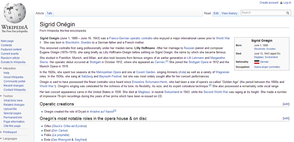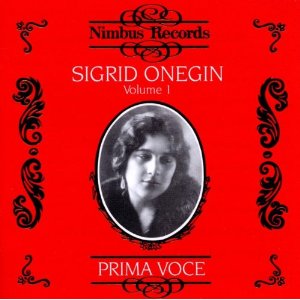|
Sigrid Onégin (June 1, 1889 – June 16, 1943) was a Franco-German operatic contralto who enjoyed a major international career prior to World War II . She was born in Stockholm, Sweden to a German father and a French mother.
This renowned contralto first sang professionally under her maiden name, Lilly Hoffmann. After her marriage to Russian pianist and composer Eugene Onégin (1870–1919), she sang briefly as Lilly Hoffmann-Onégin before settling on Sigrid Onegin, the name by which she became famous. She studied in Frankfurt, Munich, and Milan, and also took lessons from famous singers of an earlier generation in Lilli Lehmann and Margarethe Siems. Her operatic debut occurred at Stuttgart in October 1912, where she appeared as Carmen.[1] She joined the Stuttgart Opera in 1912 and the Munich Opera in 1919. In the 1920s, she spent two seasons at the Metropolitan Opera and one at Covent Garden, singing Amneris (Aida) as well as a variety of Wagnerian roles. In the 1930s, she sang at Salzburg and Bayreuth Festival, but she was most widely sought after for her concert performances. Onegin is said to have possessed the finest contralto voice heard since Ernestine Schumann-Heink, who had been a star of opera's so-called "Golden Age" (the period between the 1880s and World War I). Onegin's singing was celebrated for the richness of its tone, its flexibility, its size, and its expert coloratura technique.[2] She also possessed a remarkably wide vocal range. Her last concert appearance came in the United States in 1938. She died at Magliaso, in neutral Switzerland in 1943, while the Second World War was raging at its height. She made a number of impressive 78-rpm recordings during the years of her prime which have been re-issued on CD. This article uses material from the Wikipedia article "Sigrid Onégin", which is released under the Creative Commons Attribution-Share-Alike License 3.0. |
Articles, Websites & ResourcesDiscographyYouTube & Multimedia |

